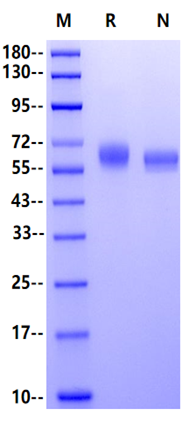His33-Asn465, with C-terminal 8*His
HGNPVDDICIAKPRDIPVNPLCIYRSPGKKATEEDGSEQKVPEATNRRVWELSKANSRFATNFYQHLADSKNDNDNIFLSPLSISTAFAMTKLGACNDTLKQLMEVFKFDTISEKTSDQIHFFFAKLNCRLYRKANKSSDLVSANRLFGDKSLTFNESYQDVSEVVYGAKLQPLDFKENPEQSRVTINNWVANKTEGRIKDVIPQGAINELTALVLVNTIYFKGLWKSKFSPENTRKEPFYKVDGQSCPVPMMYQEGKFKYRRVAEGTQVLELPFKGDDITMVLILPKPEKSLAKVEQELTPELLQEWLDELSETMLVVHMPRFRTEDGFSLKEQLQDMGLIDLFSPEKSQLPGIVAGGRDDLYVSDAFHKAFLEVNEEGSEAAASTSVVITGRSLNPNRVTFKANRPFLVLIREVALNTIIFMGRVANPCVNGGGSHHHHHHHH
1.Zeyuan Lu. Feng Wang. SerpinC1/Antithrombin IIIin kidney-related diseases. Clinical Science (2017) 131 823–831.
The gene SerpinC1 encodes a serine protease inhibitor named antithrombin III (ATIII).This protease demonstrates both anticoagulant and anti-inflammatory action. ATIII is the most important coagulation factor inhibitor, and even minor changes in ATIII can significantly alter the risk of thromboembolism. ATIII can also suppress inflammation via a coagulation-dependent or -independent effect. Moreover, apart from ATIII deficiency, ATIII and its gene SerpinC1 may also be related to many diseases (e.g. hypertension, kidney diseases). The present review summarizes how ATIII affects the progress of kidney disease and its mechanism.
